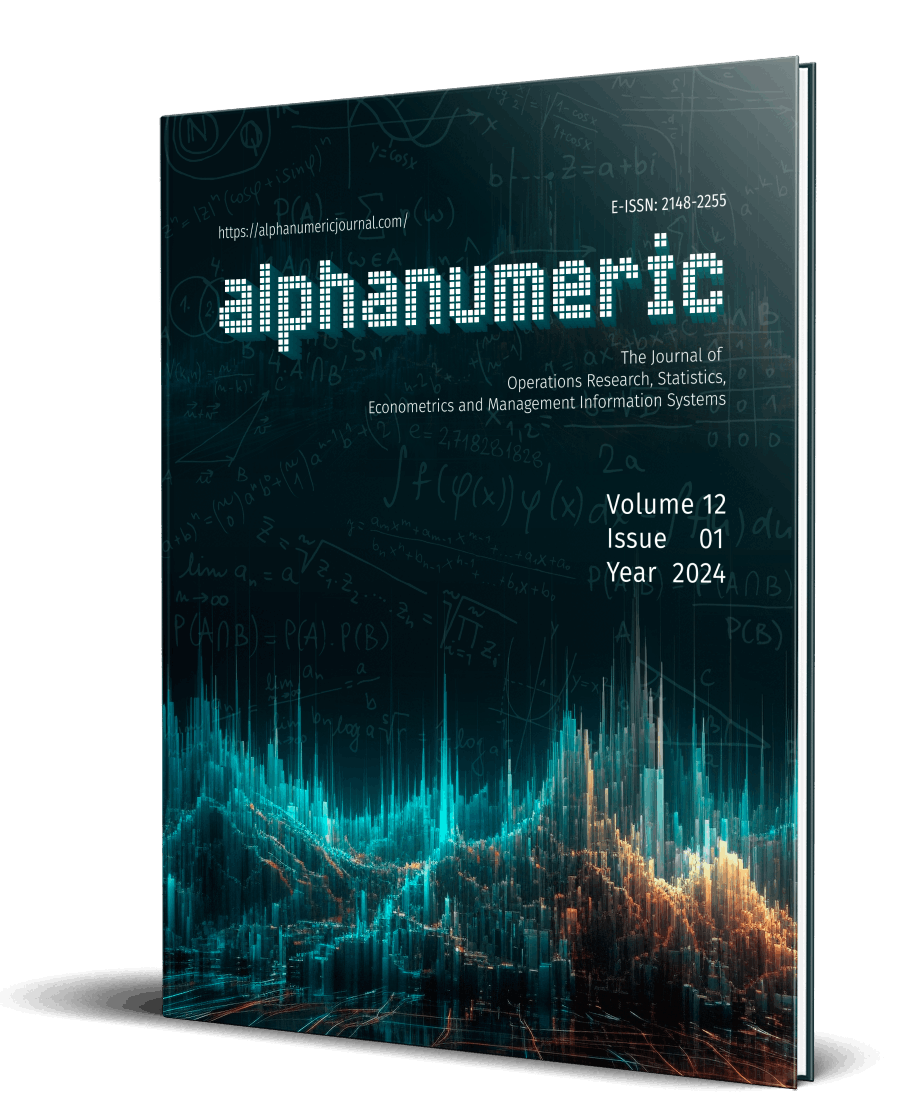
alphanumeric journal
The Journal of Operations Research, Statistics, Econometrics and Management Information Systems
A Novel Game-Theoretical Approach for The Possibilistic Mean - Variance Model
Abstract
Possibility theory is a significant tool to deal with imprecise probability and benefit from expert knowledge. Thus, the possibilistic mean-variance (MV) model is a considerable alternative for the portfolio selection problem. In this study, we propose an extension of the possibilistic MV model to the multiple market strategies where we assume that the possibility distributions of asset returns are given with triangular fuzzy numbers. The proposed extension related to the game theory is provided with a linear optimization problem. Thus, it can be solved with the Simplex algorithm as in this study. After giving the theoretical points, we illustrate it by using a numerical example.
Keywords: Fuzzy Set, Game Theory, Linear Optimization, Portfolio Selection, Possibility Theory
Jel Classification: C61, C72, G11
Suggested citation
(). A Novel Game-Theoretical Approach for The Possibilistic Mean - Variance Model. Alphanumeric Journal, 12(1), 1-12. https://doi.org/10.17093/alphanumeric.1244061
References
- Carlsson, C., & Fullér, R. (2001). On possibilistic mean value and variance of fuzzy numbers. Fuzzy Sets and Systems, 122(2), 315–326. https://doi.org/10.1016/s0165-0114(00)00043-9
- Carlsson, C., Fullér, R., & Majlender, P. (2002). A possibilistic approach to selecting portfolios with highest utility score. Fuzzy Sets and Systems, 131(1), 13–21. https://doi.org/10.1016/s0165-0114(01)00251-2
- Corazza, M., & Nardelli, C. (2019). Possibilistic mean–variance portfolios versus probabilistic ones: the winner is... Decisions in Economics and Finance, 42(1), 51–75. https://doi.org/10.1007/s10203-019-00234-1
- Dubois, D. (2006). Possibility theory and statistical reason-ing. Computational Statistics & Data Analysis, 51(1), 47–69. https://doi.org/10.1016/j.csda.2006.04.015
- Fullér, R., & Harmati, I. Á. (2017). On Possibilistic Dependencies: A Short Survey of Recent Developments. In Studies in Fuzziness and Soft Computing (pp. 261–273). Springer International Publishing. https://doi.org/10.1007/978-3-319-64286-4_16
- Göktaş, F. (2024). The Possibilistic Mean-Variance Model with Uncertain Possibility Distributions. Mehmet Akif Ersoy Üniversitesi İktisadi Ve İdari Bilimler Fakültesi Dergisi. https://doi.org/10.30798/makuiibf.1389261
- Göktaş, F., & Duran, A. (2020). Olabilirlik ortalama – varyans modelinin matematiksel analizi. Balıkesir Üniversitesi Fen Bilimleri Enstitüsü Dergisi, 22(1), 80–91. https://doi.org/10.25092/baunfbed.677022
- Goldfarb, D., & Iyengar, G. (2003). Robust Portfolio Selection Problems. Mathematics of Operations Research, 28(1), 1–1. https://doi.org/10.1287/moor.28.1.1.14260
- Jiao, H., & Li, B. (2022). Solving min–max linear fractional programs based on image space branch-and-bound scheme. Chaos, Solitons & Fractals, 164, 112682–1. https://doi.org/10.1016/j.chaos.2022.112682
- Markowitz, H. (1952). Portfolio selection. The Journal of Finance, 7(1), 77–91. https://doi.org/10.1111/j.1540-6261.1952.tb01525.x
- Raghavan, T. (1994). Zero-sum two-person games. In Hand- book of Game Theory with Economic Applications (Vol. 2, pp. 735–768). Elsevier. https://doi.org/10.1016/S1574-0005(05)80052-9
- Rustem, B., Becker, R. G., & Marty, W. (2000). Robust min–max portfolio strategies for rival forecast and risk scenarios. Journal of Economic Dynamics and Control, 24(11–12), 1591–1621. https://doi.org/10.1016/s0165-1889(99)00088-3
- Sikalo, M., Arnaut-Berilo, A., & Zaimovic, A. (2022). Efficient Asset Allocation: Application of Game Theory-Based Model for Superior Performance. International Journal of Financial Studies, 10(1), 20–21. https://doi.org/10.3390/ijfs10010020
- Souliotis, G., Alanazi, Y., & Papadopoulos, B. (2022). Construction of Fuzzy Numbers via Cumulative Distribution Function. Mathematics, 10(18), 3350–3351. https://doi.org/10.3390/math10183350
- Taş, O., Kahraman, C., & Güran, C. B. (2016). A Scenario Based Linear Fuzzy Approach in Portfolio Selection Problem: Application in the Istanbul Stock Exchange. Journal of Multiple-Valued Logic & Soft Computing, 26(3–5), 269– 294.
- Tütüncü, R., & Koenig, M. (2004). Robust Asset Allocation. Annals of Operations Research, 132(1–4), 157–187. https://doi.org/10.1023/b:anor.0000045281.41041.ed
- Young, M. R. (1998). A Minimax Portfolio Selection Rule with Linear Programming Solution. Management Science, 44(5), 673–683. https://doi.org/10.1287/mnsc.44.5.673
- Zhang, W.-G., Zhang, X.-L., & Xiao, W.-L. (2009). Portfolio selection under possibilistic mean–variance utility and a SMO algorithm. European Journal of Operational Research, 197(2), 693–700. https://doi.org/10.1016/j.ejor.2008.07.011
- Zhang, Y., Li, X., & Guo, S. (2017). Portfolio selection problems with Markowitz's mean–variance framework: a review of literature. Fuzzy Optimization and Decision Making, 17(2), 125–158. https://doi.org/10.1007/s10700-017-9266-z
2024.12.01.OR.01
alphanumeric journal
Pages 1-12
Received: Jan. 23, 2023
Accepted: July 1, 2024
Published: July 20, 2024
2024 Göktaş, F.
This is an Open Access article, licensed under Creative Commons Attribution-NonCommercial 4.0 International License.

scan QR code to access this article from your mobile device
Contact Us
Faculty of Transportation and Logistics, Istanbul University
Beyazit
Campus 34452 Fatih/Istanbul/Türkiye
Bahadır Fatih Yıldırım, Ph.D.
editor@alphanumericjournal.com
+ 90
(212) 440 00 00 - 13219
alphanumeric journal
alphanumeric journal has been publishing as "International Peer-Reviewed Journal" every six months since 2013. alphanumeric serves as a vehicle for researchers and practitioners in the field of quantitative methods, and is enabling a process of sharing in all fields related to the operations research, statistics, econometrics and management informations systems in order to enhance the quality on a globe scale.

